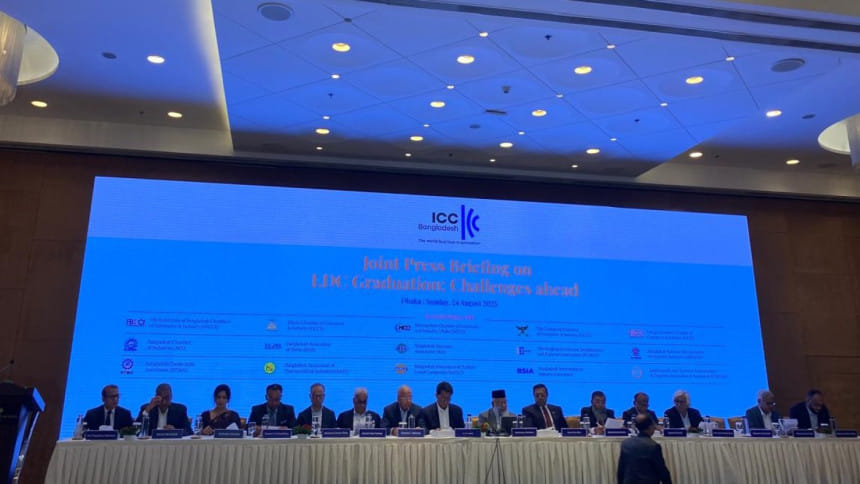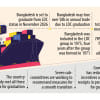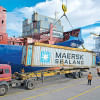Delay LDC graduation to 2032

Leaders of 16 major business chambers and associations have urged the government to delay Bangladesh's graduation from the least developed country (LDC) club, saying that an early transition would severely strain the pharmaceuticals and garment industries.
The government should defer it until 2032 as both the private sector and the government need more preparation for a smooth graduation, said Mahbubur Rahman, president of the International Chamber of Commerce Bangladesh (ICCB), at a joint press conference in Dhaka yesterday.
Representatives from the country's top trade bodies spanning pharmaceuticals, garments, knitwear, banking, footwear, leather, semiconductors and other industries attended the event to show solidarity.
At the event at InterContinental Dhaka, they argued that if the country moves to developing nation status in November 2026 without being fully prepared, most sectors serving both domestic and international markets risk serious setbacks.
Their major concerns include a loss of competitiveness, as Bangladesh will forfeit duty-free trade preferences, face tariffs of up to 12 percent, and risk losing between 6 and 14 percent of its export share.
The business leaders said they plan to meet Chief Adviser Professor Muhammad Yunus soon to press their case.
This comes despite the chief adviser stating last year that deferring graduation was not an option, and urging swift, coordinated action as recently as May.
In a written statement, ICCB President Rahman said Bangladesh's pharmaceutical industry meets 98 percent of local demand and exports to more than 150 countries, but requires an extension of the TRIPS (Trade-Related Aspects of Intellectual Property Rights) waiver to remain competitive.
"Without at least six more years of preparation, the cost of life-saving medicines such as cancer and HIV drugs could skyrocket, undermining both public health and export growth," he said.
Currently, Bangladesh enjoys a TRIPS waiver valid until January 2033 or until graduation, whichever comes first. But once the country graduates in November 2026, this protection will expire, exposing the local pharma sector to full patent enforcement.
In this regard, Rahman cited alarming projections.
He said the price of cancer drug Imatinib could soar from $30-$40 a month to $2,000$-3,000, HIV antiretrovirals from $100-$150 a year to $10,000-$12,000, while biotech drugs like Trastuzumab could jump from $200-$400 a dose to $3,000-$4,000.
The garment sector, which generates over 81 percent of export earnings, faces equally tough challenges. With duty-free access ending, compliance costs rising and competition intensifying, exporters will need to diversify rapidly to protect jobs and sustain growth.
"By diversifying exports beyond garments, Bangladesh can create new growth engines, protect jobs, and ensure sustainable economic progress after graduation," Rahman said.
The business community called on the government to seek a three to five-year deferment of the November 2026 deadline.
They pointed to examples such as the Maldives, which deferred graduation by eight years, and Botswana, which took 20 years. Other countries, including Vanuatu, Nepal, Myanmar and Bhutan, also delayed their graduations.
Rahman added that Bangladesh needs more time to negotiate trade deals with the European Union, United Kingdom, ASEAN and Gulf countries to cushion the blow of higher tariffs, especially from the US market.
He also stressed the need for export diversification into pharmaceuticals, IT, leather, agro-processing and light engineering.
"The economy is heavily affected by external debt stress, financial strain, declining inflow of foreign direct investment, global trade tensions, climate pressures, electricity and gas constraints, logistics bottlenecks, devaluation of the local currency, and the economic pressures after the July 2024 uprising," he said.
"So, Bangladesh needs to improve these areas before graduation. Let this be clear that graduation is certain, but success is not guaranteed. It depends on how urgently and collectively we act."
He emphasised that before graduation, Bangladesh must defend market access through trade diplomacy, strengthen competitiveness with technology and skills, and move decisively from planning to execution.
The ICC-B chief also said that financial sector reform, ease of doing business, and reliable energy supply through exploration, renewables and regional power trade were listed as priorities.
Upgrading ports, customs and transport networks to reduce costs, managing inflation, building reserves and restructuring external debt will also be essential, Rahman added.

 For all latest news, follow The Daily Star's Google News channel.
For all latest news, follow The Daily Star's Google News channel. 







Comments